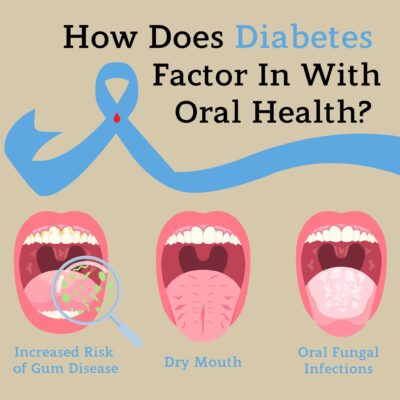
When we think of diabetes, most of us tend to immediately think about blood sugar levels and what we’re eating. But did you know that diabetes can also impact your oral health?
Our mouths are linked to the other systems of our bodies so when one area experiences problems, it can cause a domino effect and trigger other issues and this is the case with diabetes.
If you have concerns or questions about this, or if you’re dealing with diabetes and how it impacts your teeth – and what steps you can take to preserve your oral well-being – don’t hesitate to reach out to our dentist near you. At Agape Dental, we know that a healthy life begins with a healthy smile. Contact us today if you need dental assistance of any kind.
Why Oral Health Matters with Diabetes
High blood sugar doesn’t just affect your heart, kidneys, and eyes—it also influences the health of your mouth. Here’s how:
- More Sugar, More Bacteria: The bacteria residing in your mouth love sugar. When the blood sugar levels in your body are high, it increases the amount of glucose that’s present in your saliva, giving bacteria a place to gather and encouraging plaque to form.
- Weakened Immune Response: Diabetes can slow your body’s ability to fight infections, including infections that arise in your gums, which means there’s a higher chance of gingivitis or advanced gum disease occurring.
- Slower Healing Times: Cuts, sores, and even surgical procedures like tooth extractions or gum treatments can take longer to heal if you don’t properly manage your diabetes.
- Dry Mouth: Diabetes can reduce saliva production, which leads to dry mouth, formally known as xerostomia. Saliva is a natural defence system as it washes away food and other debris. Less saliva means your teeth are more at risk for cavities and infections.
Common Oral Health Issues in Diabetics
People with diabetes can face a number of dental issues. These are described in detail below:
- Gum Disease: This condition is more common and can become more severe in people with diabetes. Red, swollen, bleeding gums are often the first sign., and indicate gingivitis. This is the first stage of gum disease. If left untreated, it can progress, leading to tissue recession and tooth loss.
- Thrush (Oral Candidiasis): Thrush is a fungal infection caused by Candida albicans, which thrives in sugary environments. If it’s present, you may notice unnatural white or red patches in your mouth that can cause discomfort.
- Tooth Decay: Less saliva and higher sugar levels increase your risk of both major and minor tooth decay.
- Bad Breath: Chronic bad breath, or halitosis, can be a symptom of gum disease, dry mouth, or bacterial buildup—all of which are more common when blood sugar isn’t well managed.
- Burning Mouth Syndrome: Some people who have diabetes can experience a burning sensation on the tongue, lips, or elsewhere in their mouth, which is associated with nerve issues or dry mouth.
Tips for Managing Oral Health with Diabetes
Fortunately, if you or a loved one have diabetes, you can still maintain excellent dental health. Alongside visiting your dentist in Millwoods for regular exams and cleanings, here are other effective strategies that can help you stay on top of any issues:
- Control Your Blood Sugar: This is arguably one of the most important steps. Responsibly managing your glucose levels helps your body successfully battle infections and promotes full healing.
- Brush and Floss Daily: Brush twice a day with fluoride toothpaste and floss at least once a day. It may seem like a small measure, but this does wonders for your smile.
- Stay Hydrated: Not only does drinking water keep you hydrated, but it helps combat dry mouth too. Chewing sugar-free gum can also increase saliva flow.
- Avoid Tobacco: It’s no secret that smoking negatively impacts your oral health, but it can be especially damaging for those with diabetes. Your mouth and body can’t heal as fast, and complications can occur after surgeries.
- See Your Dentist Regularly: Whether you come in for a dental cleaning in Millwoods or need a root canal, make sure you let your dentist know you have diabetes. They can monitor your dental health more closely, suggest tailored treatments, and provide advice on how to care for your smile between appointments.
- Watch for Warning Signs: Bleeding gums, dry mouth, loose-feeling teeth, or unusual tissue patches forming in your mouth are just a few signs that you shouldn’t ignore. Call your dentist even if you don’t think you need care — it can mean all the difference between a simple treatment and a more invasive surgery.
Don’t be nervous to speak up about any worries you have. Dentists are here to help you with your oral health needs, and that starts with open communication. Your voice matters and you have every right to feel informed and confident when it comes to your dental care.
Need Dental Assistance? We Can Help
Poor oral health can make it difficult to manage blood sugar, and high blood sugar can have consequences for your oral health. It goes both ways – which is why it’s crucial to look after your smile just as much as the rest of your body. Eating well, drinking water, adhering to a hygiene regimen, and attending biannual dental cleanings near you are just a few helpful methods that will protect your teeth.
At Agape Dental, we are here to guide you as you navigate each chapter of your oral health journey. If you’re ready to schedule a consultation, please call or message us today.

